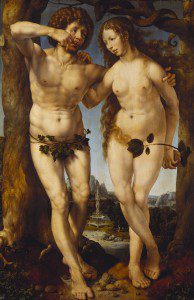
Lectionary Reflections for the First Sunday in Lent
March 9, 2014
Genesis 2:15-17, 3:1-7 (preferred reading, Genesis 2:15-3:7)
Psalm 32
Romans 5:12-19
Matthew 4:1-11
We begin our Journey into Lent with the affirmation that God’s grace is greater than our sin. The story of Adam and Eve, the primordial legend of humankind’s evolution, begins with relationship and creativity and ends with ambiguity and uncertain adventure. Still, they grow in spite of, and perhaps because of, leaving the garden. The passage from Romans proclaims the universality of grace: we have made a mess of things but God’s grace pursues those who are most ardent in sinful behaviors. Nothing, even including our sin, can separate us from the love of God. Jesus travels to the wilderness for a retreat and comes to terms with the possibilities as well as challenges of his vocation as God’s emissary and healer of humankind.
The Genesis passage, despite popular explanations, is a clear argument against the misnamed doctrine of original sin. Sin is, in fact, derivative; the goodness of humankind and the universe is original, and prior to any misadventures on our part. Today’s reading begins with human creativity, tilling the garden and naming the animals. The mythical first couple lives an idyllic existence: there is no dissonance between instinct and action. They do what they are told, without objection or second thoughts. They are naked and unashamed.
The question of the Genesis passage is whether the fall of humankind is upward or downward. The mythical couple eats from the tree of knowledge of good and evil, and experience the complexity and dissonance of life for the first time. They no longer align themselves fully with God’s vision; however, the dissonance allows them greater agency. As Jewish scholars have noted, the first sin does not alienate the first couple from God: God continues to protect and inspire them. They go forth from the garden, never to return to childhood innocence, but they become parents, history makers, and creators, claiming their own agency in relationship with God.
Psalm 32 connects confession with well-being. The act of confession is a form of communion with God which restores relationship and opens us to the loving energies of God. Our lack of self-awareness leads to alienation from God and contributes to ill health. Confession allows for the emergence of healing power that can enhance our spiritual and relational stature. Confession is good for the soul, and also the body.
The words of Romans 5 introduce within Christian writings the doctrine of first, or “original” sin. The first couple’s sin upsets our personal and cosmic well-being. Suffering and death – the dissonance of mortality – enter the world. Life becomes messy, and so does death, but the story does not end with human alienation from God and others. In Christ sin is defeated; its alienating power is overcome by God’s love. While all die in Adam, all live in Christ.
Paul may be saying more than he intends – he certainly is saying more than most of his interpreters – when he proclaims the universality of grace. No Calvinist, separating the world into saved and damned, or Lutheran (following Luther’s Bondage of the Will), asserting that God passes over the lost, Paul’s universalism embraces everyone. At the very least, God intends to save all humankind. Yet, something more may be at stake: what is it about “all” you don’t understand? Over the years, I have witnessed the misguided gymnastics of preachers and commentators attempting to interpret “all” as “some” or as limited to God’s “chosen ones,” when the clear sense of the passage suggests a grace that embraces everyone. In the spirit of Romans 8: if nothing can separate us from the love of God, then at some deep level no one can be separated from the love of God.
Matthew’s Gospel describes Jesus’ retreat in the wilderness. Inspired by his baptism and the descent of the Spirit, Jesus discovers that the Spirit both agitates and comforts. He is driven into the desert for a time of introspection and spiritual discernment. He discovers, with the North African Desert Mothers and Fathers, that the desert is full of life: he confronts the temptations inherent in the power he now possesses. He may use his vocation for good or for ill; he may succumb to “good things” (security, power, and comfort) that stand in the way of embodying the “best things.” Every gift comes with temptations and the greater the gift, the greater potential for misuse and self-interest.
Jesus responds to the temptations inherent in his vocational power by prayerfully taking these temptations to God. Jesus has agency but unlike the primordial couple, he seeks to blend his agency with God’s creative vision. In so doing, Jesus’ power is focused and transformed to achieve healing and wholeness for all generations.
The Lenten wilderness journey provides a great opportunity for spiritual discernment. Insightfully and imaginatively interpreted, today’s passages invite us to consider our relationships with one another and with God. They help us understand confession as a positive practice, nurturing our spirits and even our physical well-being. They call us to consider our vocations and the temptations inherent in our deepest gifts and passions.













